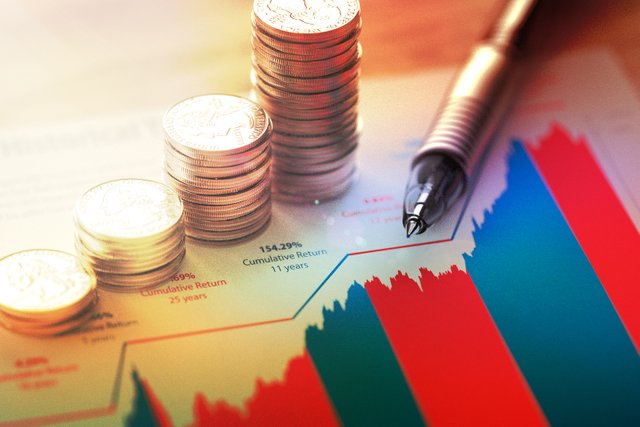Speculation and greed
The spot market price is the current sales price and the futures price is a fixed price at a specific date of delivery (and payment) in the future. Establishing these future contracts is a way for producers to hedge, protect themselves, against future price drops and for buyers a hedge against rising prices. However, this opens the door for speculation and greed (or even manipulation).
Problem is that traders can influence the coffee price without ever touching or seeing the beans.
Coffee is traded on regulated markets. Speculators buy and sell prices and the prices that they negotiate are the amount traders expect to pay for the product in the future. No real coffee is involved but the actions of these traders/speculators/manipulators affect the markets and this is one of the reasons that the price of coffee sometimes being so volatile.
.jpg)
Source: https://www.flickr.com/photos/ahmadnawawi/3808452611/
Imagine a cooperative in Central America with some 50 members that produce enough to fill 3 containers and thus make 3 contracts. They hired someone to do the trading and he has to sell in March, the closest month after finishing harvest and processing. As they needed the money to finance the members he already made the first contract (for one container) and took a loan at the local bank. Everything is set and he starts watching the ticker for coffee futures on a web site for the next months.
As everybody knows, prices can go up, down or stay the same in the market. The basic strategy, and the only safe one, is to average down the prices. That is to say, independently of the prices going up or down, fix contracts at specific moments (and/or at specific price targets). If you have sufficient containers to fill, this could be each month for instance. You could fine-tune this a bit looking at historical data and look for months that statistically have higher prices or use some other criteria. Point is, when you have a strategy, you should not diverge from it. Now, what could go wrong?
Prices are going up
Here we see the biggest pitfalls of course. “Let’s just wait a little bit longer because I’m sure the prices will still get higher”. Prices could be going up because of a predicted frost in Brazil or just pure speculation. So if you wait too long, prices could drop dramatically and you could be forced to sell at a much lower price.
If you have enough coffee and prices keep going up you should just keep selling bit by bit and the average will still be ok normally, but our cooperative only has 2 more contracts to fill, so the decision when to sell is a difficult one. There have been cases where cooperatives (or exporters) saw prices keep getting higher and higher and they decided to buy more coffee locally and thus sell more coffee at a higher price. This has led to situations where more coffee was sold than produced or could be bought. Not being able to fill your contract mains stiff fines and, in the case of direct sales, worsening relationships with the buyers.
Prices are going down or stay the same
Essentially the problem is the same, if you can average (you have a lot of coffee) you should be ok, but our cooperative could be in problems. If you fixed your price at a low and prices rise substantially afterwards the members will not be happy. And if prices get around or below production costs the farmers will not be able to pay their debts. To wait and expect or hope the price will eventually go up again is very risky.

Source: https://www.flickr.com/photos/quoteinspector/40390413880/
So these are not easy decisions to make for the seller (nor buyer). But even if our guy at the cooperative does everything by the book, a lot still can go wrong. First of all, the cooperative has to educate its members and have them understand the process. This is not an easy task. There has to be no favoritism, prices should be the same for everyone (I’ve seen cases where the president and his friends claimed that “their” coffee was sold in the lot with the highest price!).
And then of course, the members have to comply with their obligation to supply the coffee. There are several possible reasons members will not meet the terms of their contracts with the cooperative but the main reason is of course that the price is too low. If they can sell their coffee locally at a better price and they do not understand how they benefit from an average price or are not loyal to their cooperative, they sell their coffee (again) to another.
Another reason could be that the date of payment is quite late. The contracts could be fulfilled some months after harvest and the cooperative should be able to resolve this problem because the members want/need their money right after harvest.
Whatever the reason, if the farmers don’t supply the coffee, the cooperative has to buy from others to complete their contract and that could be very costly or even mean the end of the cooperative.
Want to keep reading about coffee futures?
https://tradingsim.com/blog/7-things-you-must-know-about-coffee-futures/
Previous article from coffee series you can find under tag #cafescope.
You can see them all here.
Article was also published on Cafescope
Congratulations!
This post has been granted a 100% upvote, courtesy to @wokeprincess, from BlissFish!
Enjoy the Bliss!
Join us on Discord!
Now I began to understand more - they are inflating the bubble!
like every future markets :)
Who will have a lot of money to manipulate - need a counterweight system
Member of the SmartVote Community
This post has received a 3.13 % upvote from @drotto thanks to: @sbi-booster.